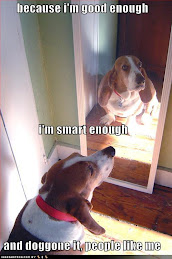The office building I work in is having the annual health fair today, and giving away all sorts of things. I think I am the only person in the world who can swivel in her chair while sitting cross-legged and have the pedometer measure over 400 steps. Watch out world - here I come! Maybe this is why they were a give-a-way.
Anyway, while I sit here swiveling, I've been working on the my participant's guide for the coaching and feedback course I'm facilitating next Friday. I actually did come up with an activity to do with the leaders, and am no longer mind-blank around the subject.
I'm going to have them play a game called, "Been There, Done That!" The leaders will work in trios, assigning themselves as Person A, B, and C. Person A thinks of something that they've done, which had some significant impact on their life. Person B's job is to find out what it is, and Person C's job is to observe and ref the exchange. Person A begins the round by saying only these words, "I did this." Person B then has to draw out what Person A did by asking facilitative questions. The twist is that Person B is not allowed to ask assumption or guessing questions. Anytime Person B asks a specific thing, for instance, "Did you go flying?" that's considered a guess/assumption. A better question would be, "Where did you go?"
It should be very interesting, and I have to give credit to my coach for the suggestion. The idea behind the game is to get them practicing being a coach. Many people are under the misconception that in leadership a coach is the same thing as a mentor. It's not. Coaching is based on the idea that the answers and direction lie within the coachee, and a good coach's role is to pull those answers and direction out of the person. A mentor actually tells you what to do through advice and life experience. So, the coach's only job is to ask questions to lead you down a path of self-discovery, and "reflect back" any patterns that they see.
When coaching around performance, the objective is to get the employee to tell you what they are doing wrong/right, and not have you tell them. Normally a manager will approach an employee and lay out everything that is happening, which makes the person defensive. The conversation normally escalates, and no one benefits. But, if you can get the employee to tell you what obstacles are hindering performance, an easier conversation results.
I've also developed a Coaching and Feedback cycle model based on some of the principals in the "One Minute Manager". Considering that their HR Director likes to tell me that they don't have time for anything, hopefully they can dedicate at least 2 minutes to having a conversation with their employees. I'm beginning to think that the HR Director is really the one who doesn't have time for anything.
Speaking of her, she also wanted me to teach about sandwiching feedback - the old school way was to tell them something positive, then something negative, and then something positive to leave with. Which resulted in two positives, and a glossed over negative with no weight. I took pleasure in relaying Roger Schwarz's "The Skilled Facilitator" methods to her. Which basically says, "be honest and test assumptions." Schwarz has been able to corner the market on the idea that people hear something and translate that into something else in their head. Therefore, get into the habit of reflecting back what you hear, to make sure it is the exact message the person intended to send. It sounds easy enough, but it's hard to do when trust hasn't been established and you feel the other person has motives and you have something to lose. It actually works in personal relationships too. I used it with my ex when I went over to his house after he broke up with me to set the boundaries for our conversation.
Mmmmm.. I love Tootsie pops, Carol just walked by and gave me one... but it's so sad, "When you come to the end of a lollipop, to the end, to the end, of a lollipop. When you come to the end of a lollipop - PLOP goes your heart!" That's a shout out to all my TCHS girls!
Subscribe to:
Post Comments (Atom)





No comments:
Post a Comment